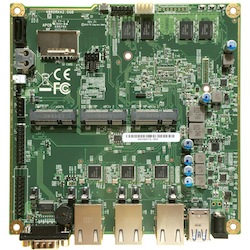apu
05 nov 2016
motivation
a few months back i’ve replaced the odroid XU4 with this APU 2c4 board.
installing nixos
first have a look into the apu2 manual.
since there is no VGA/DVI output but only a RS232 serial interface we need to use that:
serial cable
out of simplicity i soldered one myself, the pins are:
pin 2 to pin 3 pin 3 to pin 2 pin 5 to pin 5 (GND)i’ve been using this with a USB 2 RS232 converter
# lsusb Bus 003 Device 003: ID 067b:2303 Prolific Technology, Inc. PL2303 Serial Portconnecting via serial console:
picocom /dev/ttyUSB0 -b 115200nixos boot cd
download the nixos-minimal-16.03.714.69420c5-x86_64-linux.iso and use unetbootin to deploy it to an USB stick. afterwards mount the first partition of the USB-stick and append this to the syslinux.cfg file’s kernel command line:
console=ttyS0,115200n8info: using the serial console you can see the GRUB output, see the kernel’s output after boot and finally get a shell.booting from the USB stick
the apu 2c4 features corebios and the process is straight forward, just hit F10 and select the USB stick
nixos installation
basically follow the nixos manual
info: but don’t forget to include this line in
configuration.nix:boot.kernelParams = [ "console=ttyS0,115200n8" ];
/etc/nixos/configuration.nix
# Edit this configuration file to define what should be installed on
# your system. Help is available in the configuration.nix(5) man page
# and in the NixOS manual (accessible by running ‘nixos-help’).
{ config, pkgs, ... }:
let
pw = import ./passwords.nix;
in
# setfacl -R -m u:joachim:rwx /backup
{
imports =
[ # Include the results of the hardware scan.
./hardware-configuration.nix
];
# Use the GRUB 2 boot loader.
boot.loader.grub.enable = true;
boot.loader.grub.version = 2;
# Define on which hard drive you want to install Grub.
boot.loader.grub.device = "/dev/sda";
boot.kernelParams = [ "console=ttyS0,115200n8" ];
networking = {
hostName = "apu-nixi"; # Define your hostname.
bridges.br0.interfaces = [ "enp1s0" "wlp4s0" ];
firewall = {
enable = true;
allowPing = true;
allowedTCPPorts = [ 22 ];
#allowedUDPPorts = [ 5353 ];
};
};
# networking.wireless.enable = true; # Enables wireless support via wpa_supplicant.
#Select internationalisation properties.
i18n = {
consoleFont = "Lat2-Terminus16";
consoleKeyMap = "us";
defaultLocale = "en_US.UTF-8";
};
security.sudo.enable = true;
programs.zsh.enable = true;
users.defaultUserShell = "/run/current-system/sw/bin/zsh";
services = {
nscd.enable = true;
ntp.enable = true;
klogd.enable = true;
nixosManual.enable = false; # slows down nixos-rebuilds, also requires nixpkgs.config.allowUnfree here..?
xserver.enable = false;
cron = {
enable = true;
mailto = "js@lastlog.de";
systemCronJobs = [
"0 0,8,16 * * * joachim cd /backup/; ./run_backup.sh"
#* * * * * command to be executed
#- - - - -
#| | | | |
#| | | | +----- day of week (0 - 6) (Sunday=0)
#| | | +------- month (1 - 12)
#| | +--------- day of month (1 - 31)
#| +----------- hour (0 - 23)
#+------------- min (0 - 59)
];
};
};
# Set your time zone.
# time.timeZone = "Europe/Amsterdam";
# List packages installed in system profile. To search by name, run:
environment.systemPackages = with pkgs; [
borgbackup
bridge-utils
pciutils
openssl
ethtool
#borg
iotop
cryptsetup
parted
pv
tmux
htop
git
dfc
vim
wget
linuxPackages.cpupower
powertop
usbutils
ethtool
smartmontools
nix-repl
manpages
ntfs3g
lsof
iptraf
mc
hdparm
sdparm
file
dcfldd
dhex
inotifyTools
nmap
tcpdump
silver-searcher
#emacs
];
time.timeZone = "Europe/Berlin";
# Enable the OpenSSH daemon.
services.openssh = {
enable = true;
permitRootLogin = "without-password";
};
systemd.services.hostapd.after = [ "sys-subsystem-net-devices-wlp4s0.device" ];
services.hostapd = {
enable = true;
wpaPassphrase = pw.wpaPassphrase;
interface = "wlp4s0";
ssid="flux";
};
# Define a user account. Don't forget to set a password with ‘passwd’.
users.extraUsers.joachim = {
isNormalUser = true;
uid = 1000;
};
# The NixOS release to be compatible with for stateful data such as databases.
system.stateVersion = "16.09";
}WD passport USB 3.0 bug
with a WD passport USB 3.0 disk i can’t boot the system since i hit this bug.
SeaBIOS (version ?-20160311_005214-0c3a223c2ee6)
XHCI init on dev 00:10.0: regs @ 0xfea22000, 4 ports, 32 slots, 32 byte contexts
XHCI extcap 0x1 @ fea22500
XHCI protocol USB 3.00, 2 ports (offset 1), def 0
XHCI protocol USB 2.00, 2 ports (offset 3), def 10
XHCI extcap 0xa @ fea22540
Found 2 serial ports
ATA controller 1 at 4010/4020/0 (irq 0 dev 88)
EHCI init on dev 00:13.0 (regs=0xfea25420)
ATA controller 2 at 4018/4024/0 (irq 0 dev 88)
Searching bootorder for: /pci@i0cf8/*@14,7
Searching bootorder for: /rom@img/memtest
Searching bootorder for: /rom@img/setup
ata0-0: KINGSTON SMS200S360G ATA-8 Hard-Disk (57241 MiBytes)
Searching bootorder for: /pci@i0cf8/*@11/drive@0/disk@0
XHCI port #3: 0x002202a0, powered, pls 5, speed 0 [ - ]
XHCI port #1: 0x00021203, powered, enabled, pls 0, speed 4 [Super]
Searching bootorder for: /pci@i0cf8/usb@10/storage@1/*@0/*@0,0
Searching bootorder for: /pci@i0cf8/usb@10/usb-*@1
USB MSC vendor='WD' product='My Passport 0827' rev='1012' type=0 removable=0
call16 with invalid stack
PCEngines apu2
coreboot build 20160311
4080 MB ECC DRAM
documentation
how to recover a bricked BIOS (after flashing)? on APU1 it was SPI, and there’s a header, so like wires + a ch341a should do it.
wireless
the APU i’m using also has a Mini-PCIe wireless card built and you can choose from these two cards:
the access point works nicely with my android devices as well as my linux laptops.
buy the APU
if you want to buy an APU, buy the APU bundle.
summary
the APU is runnig NixOS and is very stable and fast while using little energy. would use/buy again!

